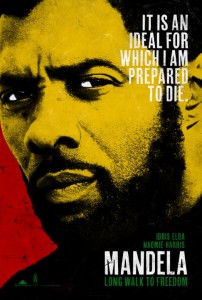Mandela: Long Walk to Freedom – Review
Early on in the film, Nelson Mandela (Idris Elba) tells us that he was given the Xhosa name “Rolihlahla”, meaning “troublemaker”. Considering the trouble he would go on to create for the ruling (racist) white class in his country, a more appropriate name could hardly have been chosen.
The problem with a life like Mandela’s is that so great is the scope of his struggle and achievements, and so fresh are they in the public consciousness that it is perhaps too ambitious to attempt to reflect all of it in the space of two hours. That was the impression I took away from this latest biopic – Mandela: Long Walk to Freedom.
It strives to showcase his mighty achievements, suddenly realizes ten minutes into the film that it is too big a task, and almost crumples up before being resurrected by some fine acting.
We first see the young, ambitious attorney in the South Africa of the early 1940s- with his energy, emotion (and the dignity he lends to the role), he gives us a Madiba for the ages. He towers over the film and his co-actors, and not because of his six foot three frame.
Naomie Harris, in an admirable performance as Winnie Madikizela, however, stands toe-to-toe with Elba and indeed, quietly steals many scenes. There are many, I am sure, who see Mandela’s struggle as a lone effort, but with her grit and determination, Harris reminds people of the enormous pressures that his wife and family suffered from and how admirably she acquitted herself in the role as not just the wife of a revolutionary, but a revolutionary herself.
One thing I appreciated about the film was that although it was an unabashed celebration of Mandela’s victories, it does not completely hide the fact that his life had considerable failures. Like his great inspiration, Mahatma Gandhi, he too had a chaotic family life. When one is the father of a nation, it is perhaps not surprising that one’s own family take a backseat. Mandela went through two divorces, and one heartbreak, and the film does not shy from portraying those. But like most of the other aspects of his life shown in the film, we see too little and are left thirsting for more when it is cut off. Mandela, a man who loved his daughters, who was absent from their life so that they could lead a free one, was not a perfect man, far from it – but one cannot help but feel sympathy for a family (and indeed many such others) torn apart because they sacrificed themselves in a nations struggle against prejudice.
Mandela spent 18 years at the infamous Robben Island prison, and as a place where hope goes to die, its portrayal in the film is strikingly well done. When Madiba is locked up in his tiny cell which is his home for the next decade, we feel the world collapsing around him, but we see a man standing tall among the ruins.
Mandela’s greatest gift, as the media has been reminding us endlessly, was his ability to forgive and come to terms with his oppressors. That inability is also the downfall of his nearest and dearest. Mandela was a truly great leader, but he was also a smart politician, a fact that this movie reminds us gently. What neither peace nor violence could achieve alone, he does by sitting across a table with his jailers and working with them.
For a film based on one of the truly well lived lives of the twentieth century, the film offers surprisingly few hair raising moments. One of those, understandably, is Mandela’s speech at the Rivonia trial, where he and fellow ANC activists were banished to a life in prison. His concluding words, about freedom being an ideal he is willing to die for, is guaranteed to raise one’s pulse. Another is a confrontation scene with Winnie Mandela where the two powerhouse performers of the movie achieve a rare co-ordinated moment of acting perfection.
Is this a bad movie? No, of course not. Is it a great one? No, far from it. But it is worth a watch, if only two see towering performances from its lead actors.
Nelson Mandela was one of the greatest human beings of our time- indeed of any time. This film offers but a tantalising glimpse of who he was and how the principles he lived for are not just for an age, but for all ages.
But not enough of a glimpse, I’m afraid.
Nowhere near enough.




